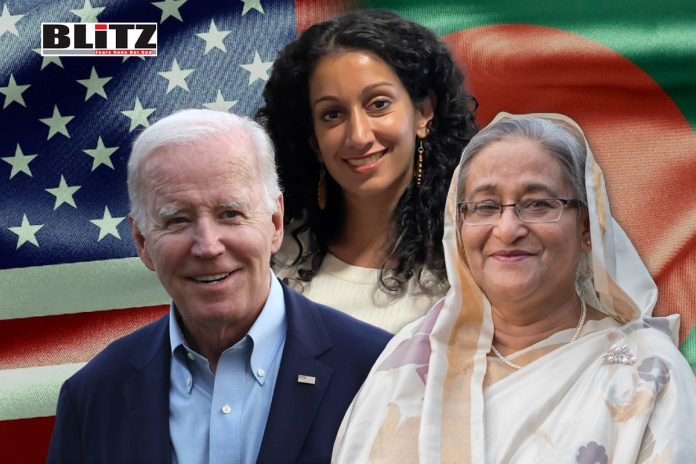The United States is showing a noticeable shift in its stance following the January 7 general election in Bangladesh. Throughout the electoral process, the Biden administration consistently stressed the importance of a free and fair election with the participation of all major parties. However, since then, the dynamics have evolved significantly.
Recently, US President Joe Biden penned a letter to Awami League President Sheikh Hasina, who formed a government with an absolute majority in the 12th national election and secured her fourth consecutive term as prime minister. The contents of this letter, shared by the US embassy with the foreign ministry earlier this month, hint at a promising “new chapter” in bilateral relations.
For the past six months, neither delegation from Dhaka nor Washington has visited the other country for talks, as there was an understanding that visits during election time would not be appropriate. However, a delegation led by US State Department Deputy Assistant Secretary Afreen Akhter is now scheduled to arrive in Dhaka at the end of February.
The team aims to engage with the director general of the North America Wing of the Ministry of Foreign Affairs, with further bilateral discussions potentially involving the foreign secretary and various other meetings. Prior to the election, the United States had expressed concerns about civil rights in Bangladesh, even going as far as concluding in a post-election statement that the voting process had not been entirely free and fair.
Prof Shahidul Haque, former foreign secretary and Bangabandhu chair at Delhi University, believes that diplomatic behavior evolves with time and circumstances, urging for a nuanced perspective. “Each country has different priorities at different times… I think we should think of it from that point of view,” he remarked.
“The issue of regional and global security comes up at the very beginning of the letter, which is very significant,” Prof Shahidul noted regarding Biden’s correspondence with Sheikh Hasina. However, he also mentioned that Bangladesh has always prioritized economic issues.
In terms of collaboration, Biden’s letter underscores cooperation between Bangladesh and the US in areas such as regional and global security, addressing the Rohingya crisis, and a shared vision for a free and open Indo-Pacific, encompassing economic development, climate change, and energy initiatives.
Bangladesh, with aspirations to achieve developed status by 2041, has introduced a variety of economic activities, from the construction of large infrastructures to radical changes in the education system. Prof Shahidul highlighted the need for foreign assistance in carrying out such a large-scale campaign. “Not only financing but also technical know-how, technology, and education are important. The United States can help in these matters.”
On the other hand, the United States, with its $27 trillion economy, sees bilateral trade with Bangladesh, amounting to about $10 billion, as significant, but perhaps not as crucial as other geopolitical considerations. “Bilateral trade was important for Bangladesh but not for the US,” Shahidul noted. “$10 billion in trade is not that significant to them. Naturally, they may want to look at Bangladesh through a broader core and non-core security lens.”
He continued: “The US always mentions that it wants Bangladesh to side with its initiative for a free and open Indo-Pacific. Security is one of the many components of the US Indo-Pacific architecture, and Bangladesh is working with the US on some of these issues.”
Security cooperation between the two countries encompasses various facets, including training, information exchange, peacekeeping efforts, maritime security, and combating terrorism and militancy. Recent developments include the provision of state-of-the-art drones by the US to Bangladesh. Additionally, both countries collaborate on issues such as climate change, food security, and energy security.
Efforts to preserve regional stability are now of utmost importance. Any instability in Bangladesh could have far-reaching consequences for the entire region, as Prof Shahidul highlighted. “South Asia cannot afford it at the moment. The stability of the region should not be allowed to be undermined.”
While unease preceding the election might gradually dissipate in Dhaka-Washington relations, lingering effects could surface, particularly concerning labor rights, with potential ramifications in international forums such as Brussels and Geneva.
The delicate balance between different forces is now more consequential than ever. Prof Shahidul labeled it a big challenge, stating that for Bangladesh to fully support any side would be improbable and not morally right. As Bangladesh navigates its diplomatic relationships, it must maintain its sovereignty and pursue policies that align with its national interests.
In conclusion, the evolving dynamics between Bangladesh and the United States signal a new chapter in their bilateral relations. With a focus on cooperation in areas such as security, economic development, and regional stability, both countries stand to benefit from a strengthened partnership that addresses mutual concerns and advances shared goals on the global stage.




